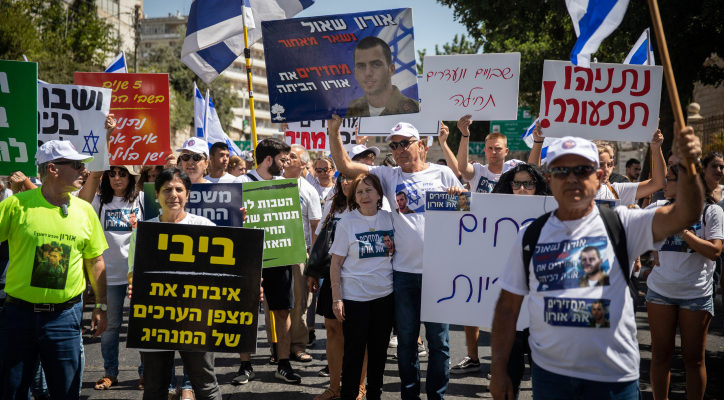Mother of soldier, whose body is held by terror group, says “Hamas is weak and this opportunity should be seized.”
By Paul Shindman, World Israel News
Israel is taking advantage of a one-time ‘window of opportunity’ in talks for a possible prisoner swap with Hamas for the release of two Israeli civilians and the bodies of two IDF soldiers, Israel Hayom reported Thursday.
Hamas is facing mounting pressure from the coronavirus pandemic. It needs medical supplies and is willing to lower its demands for a prisoner exchange.
Behind the scenes contacts between Israel and Hamas have moved into high gear since last week when Prime Minister Benjamin Netanyahu’s office released a statement acknowledging the talks were taking place through mediators. In the past Germany and Egypt have helped broker prisoner exchanges between the two sides as Israel has refused to hold direct talks with terrorists.
Palestinian sources said a senior Hamas delegation met in Cairo last week with Egyptian intelligence officials to discuss a prisoner swap, Channel 12 reported.
Israeli officials told Israel Hayom there is now a one-week window of opportunity during which Hamas could reach a conclusion and put the deal into effect. They made it clear that the parties needed to act quickly.
“We are in the best position we have been in for the last six years,” the officials said. “An agreement can be reached. It’s within reach, but if we don’t act quickly, the opportunity will be lost.”
Earlier this month Hamas leader Yahya Sinwar sent some positive signals sparking hopes of reaching an agreement, and to return to Israel the bodies of IDF soldiers Hadar Goldin and Oron Saul, and civilians Abra Mengistu and Hisham a-Sayed.
Shaul and Goldin were killed in action during the 2014 Gaza war and their bodies are being held hostage by Hamas. Both of the civilians have mental health issues and walked on their own across the Gaza border in 2014 and 2015.
“Hamas is weak and we have to exploit this opportunity. Sinwar is in a position where he needs us, so we should just resolve the matter and return the soldiers and civilians to us,” Leah Goldin, Hadar Goldin’s mother, said in an Israel Army Radio interview.
In the most famous prisoner exchange with Hamas in 2011, Israel released more than 1,000 Palestinian prisoners, including hundreds serving life sentences for attacks on Israelis, in order to gain freedom for IDF soldier Gilad Shalit who had been held hostage after being captured by Hamas in a 2006 tunnel attack that left two other IDF soldiers dead.
Hamas is reportedly deeply worried by the coronavirus health crisis and is hoping a release of prisoners will help their image in the eyes of Gaza residents.
Arab media reports indicate Hamas demands include the freeing of terrorists originally released in the Shalit deal, but who were re-imprisoned for continued involvement in terror activities, along with the release of older and ill prisoners, women and minors.
Although only 14 Gazans have been found to be infected so far with coronavirus, there are fears that a widespread outbreak will lead to a collapse of the weak healthcare system in the Gaza Strip.
In recent weeks, international organizations have transferred large-scale aid and equipment to Gaza, and Israel has also made it clear that it will help with whatever is needed to deal with the pandemic.





